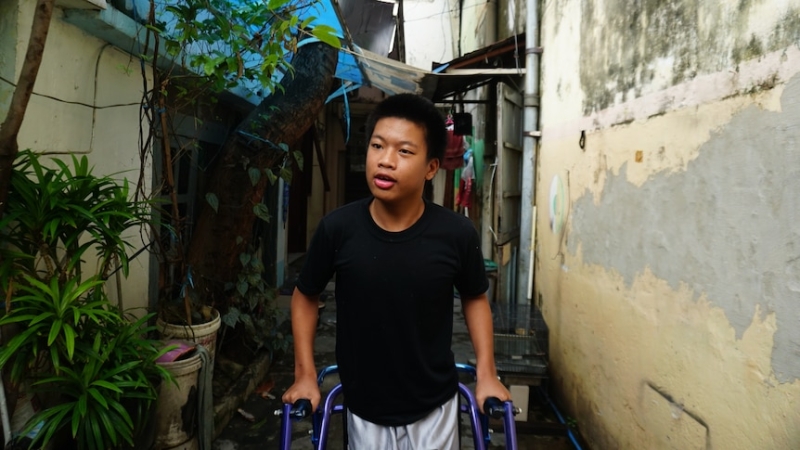Jonathan lives with his grandmother and a carer in Indonesia. (ABC News: Kristian Oka Prasetyadi)
In short:
A family faces deportation to Indonesia after having their permanent residency visas rejected because of the expected cost of treating their son, who has cerebral palsy.
Melbourne-born Jonathan has not spent more than half his life in Australia, meaning he is not eligible for an automatic migration waiver for disabled children.
What's next?
Disability advocates argue the government should provide a health waiver for all children born in Australia.
Watching cars drive past is Jonathan's reward for completing his daily walk down the narrow alley where he lives.
Thousands of kilometres away in Melbourne, his parents are praying for a miracle.
Lily Lumintang and Martin Cahyo have lodged a request for a ministerial intervention after exhausting all legal avenues to obtain permanent residency for their family of four, including 14-year-old Jonathan, who has cerebral palsy.
"We were told in mid-October [2024] to complete a medical check-up, and police clearance in Indonesia and Australia for our case to be reviewed by an assistant minister, but we haven't heard anything since," Ms Lumintang said.
The Indonesian family are pleading with Immigration Minister Tony Burke to grant their eldest son a health waiver so he can be reunited with them in Australia after more than a decade of living apart.
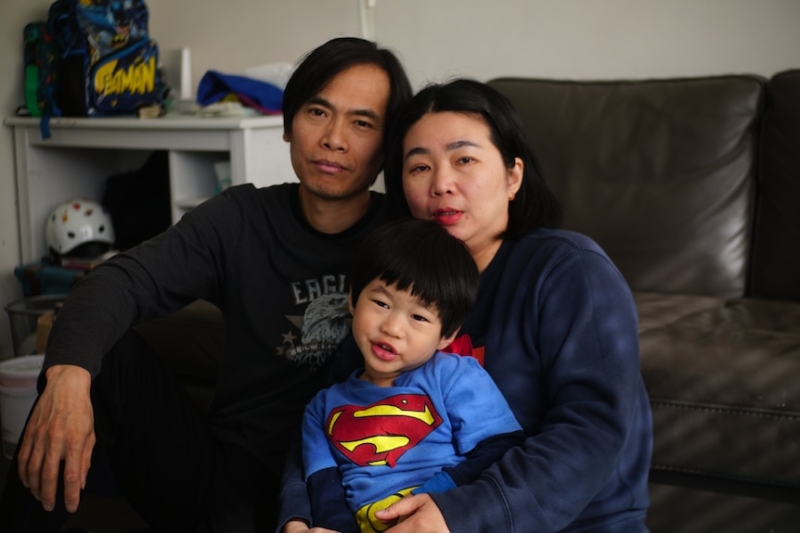
Martin Cahyo and Lily Lumintang with their younger son Raphael in Melbourne. (ABC News: Kristian Oka Prasetyadi)
Ms Lumintang first arrived in 2009 to study accounting and began a relationship with Mr Cahyo, who was working in Melbourne.
The following year, their son Jonathan was born with abnormalities in his corpus callosum — a bundle of nerve fibres that connects the brain's right and left hemispheres.
Ms Lumintang and Mr Cahyo live in Melbourne's eastern suburbs with their younger son, three-year-old Raphael.
Jonathan has lived in Indonesia since 2012, after his father took him back due to "family issues".
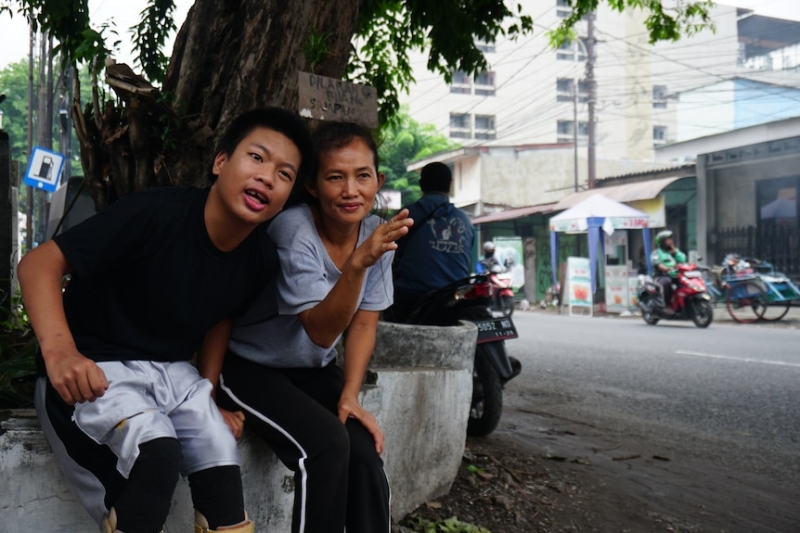
Jonathan watches cars with his carer Ayung Tarunawati in Surabaya. (ABC News: Kristian Oka Prasetyadi)
Mr Cahyo returned to Melbourne a few years later to find a job and prepare financially to bring Jonathan back to Australia.
Wanting to build a new life in Australia, the family applied for permanent residency but the application was rejected in 2021 because of "undue costs to the Australian community" of paying for Jonathan's care long-term.
An appeals tribunal upheld the decision in 2023, estimating that Jonathan's treatment by health and community workers would cost the public purse $2.51 million over 10 years.
Having called Australia home for more than 15 years, they now face deportation.
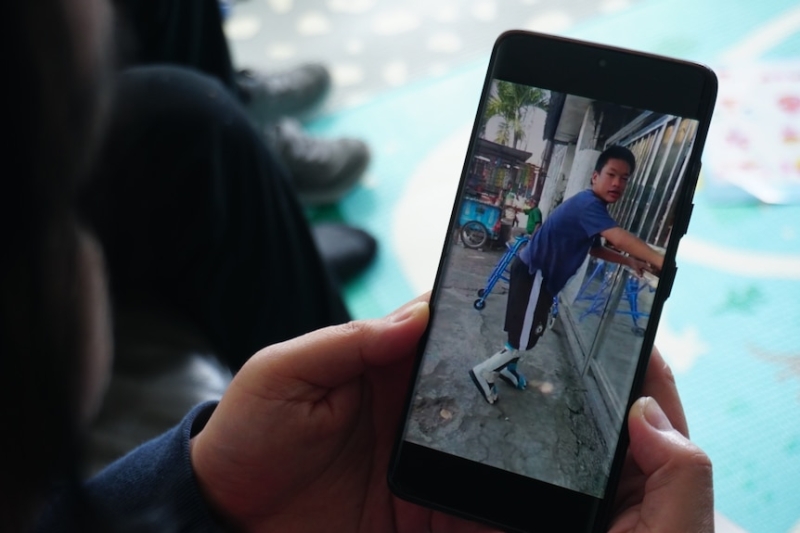
Ms Lumintang looks at a photo of Jonathan on her phone. (ABC News: Kristian Oka Prasetyadi)
'About money, not human rights'
Perth-based immigration lawyer Jan Gothard explained that at the heart of the problem was the exemption of the Migration Act from the Disability Discrimination Act.
"The Department of Home Affairs can discriminate against people with disability, and that's perfectly legal," said Dr Gothard, who is also the co-founder of campaign group Welcoming Disability.
Australia-Indonesia Disability Research and Advocacy Network president Dina Afrianty said people from developing countries move to Australia because they see it as a country that respects individual and human rights.
"They never prioritise the disabled in Indonesia, so the journey to equality is still long and winding," she said.
Jonathan's case was unique as he, despite being Australian-born, had not spent most of his life in the country, Ms Lumintang said.
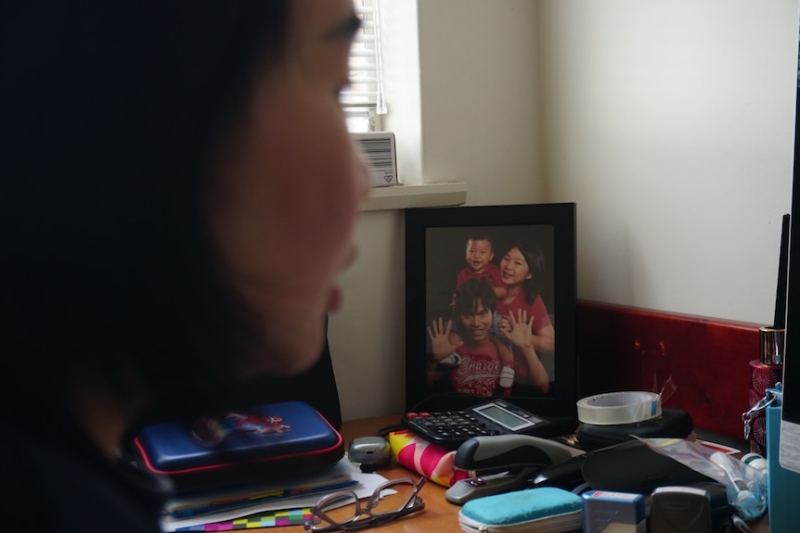
A portrait of Jonathan with his parents as a young boy. (ABC News: Kristian Oka Prasetyadi)
He is thus ineligible for an automatic migration health waiver for disabled children, put into effect last October, which requires them to be born and reside in Australia for at least half their life.
That means Jonathan is subject to the "significant cost threshold" — a cap on anticipated medical and educational costs for a would-be migrant.
His expected care costs, as calculated by the government, were exponentially higher than the significant cost threshold of $51,000 over the course of a decade that was in place until mid-2024.
"It's a heartbreaking regulation because [the government] discriminate people based on their disability," said 43-year-old Ms Lumintang, who works as a contract administrator at a local construction company.
"It's all about money, not about human rights."
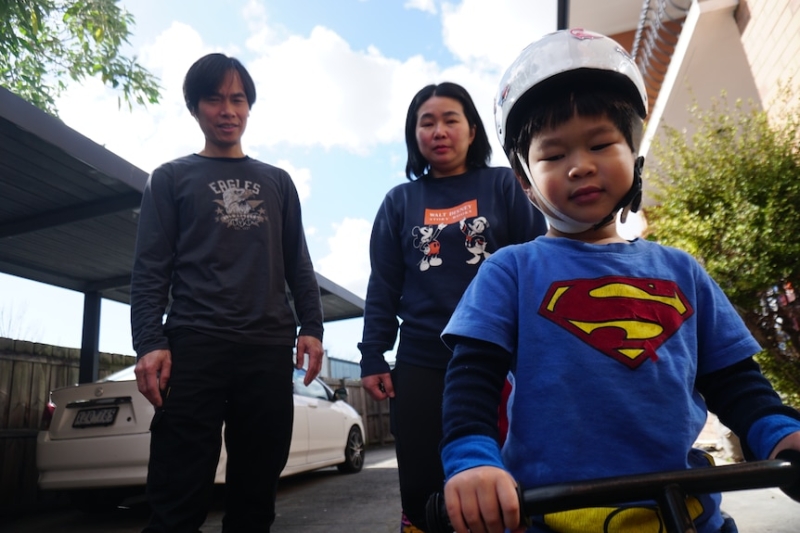
Mr Cahyo and Ms Lumintang want to continue their lives in Melbourne. (ABC News: Kristian Oka Prasetyadi)
Dr Gothard said the significant cost threshold, while intended to protect the healthcare system, had become a discriminatory instrument enshrining an assumption that people with disability were a "financial burden on the community" into Australian law.
"When we say to people with disability outside Australia, 'We really don't want you here,' we're sending a message to people with disability in Australia that, given the choice, we would rather not have people with disability in our community," she said.
La Trobe law researcher Piers Gooding said the UN Commitee on the Rights of Persons with Disabilities had long advised the Australian government to remove the legal exemption of the Migration Act from certain provisions in the Disability Discrimination Act — but that call was yet to be heeded.
The Australian-born children the government wants to deport because they have a disability
Photo shows Young boy Kayaan is sitting in a chair with a huge smile, as both his parents smile at him.
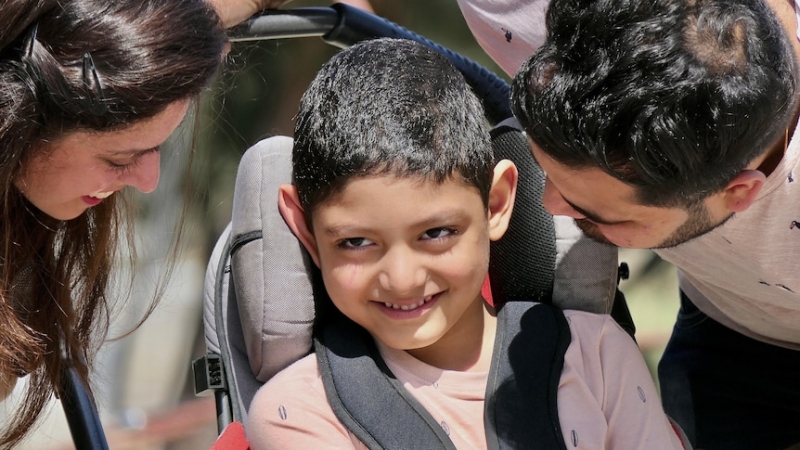
Past cases of families with disabled children include that of WA-based Kayban Jamshaad, 7, who has haemophilia and brain injury, and an 11-year-old with Down syndrome, Aaryan Aneesh.
Kayban was allowed to stay after the health waiver was introduced, and Aaryan was granted permission to stay after a ministerial intervention.
Yet, unlike Jonathan, both had lived their whole lives in Australia.
Welcoming Disability wants the government to provide a health waiver for all Australian-born children.
"That's not to say their families automatically get a visa," Dr Gothard said, referring to requirements including skills, employment, and community ties.
"They've still got to meet all the other very rigorous criteria."
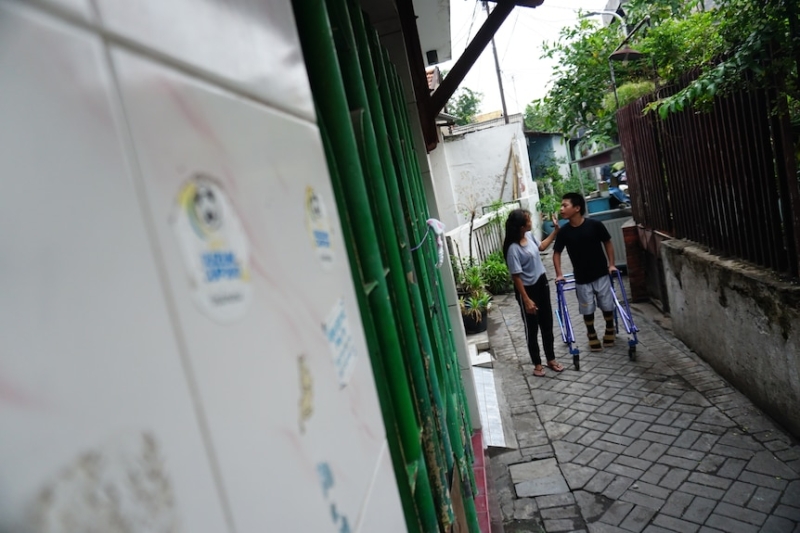
Ms Tarunawati helps Jonathan do his daily exercise, in line with his parents' care plan. (ABC News: Kristian Oka Prasetyadi)
A Home Affairs spokesperson said it does not comment on individual cases, but noted the significant cost threshold had been raised to $86,000 over a decade after a policy review initiated by then-immigration minister Andrew Giles.
Away from parents
Back in Indonesia, car-obsessed Jonathan lives with his 83-year-old paternal grandmother, Estephine Kalalo, and full-time unlicensed carer, Ayung Tarunawati, in Surabaya — a city 45 minutes by air from Bali.
Ms Tarunawati said she was with Jonathan at all times, sharing a bedroom with him and Ms Kalalo.
His parents had provided detailed care instructions including for his diet, she said, to ensure he remained healthy and continued to grow more independent.
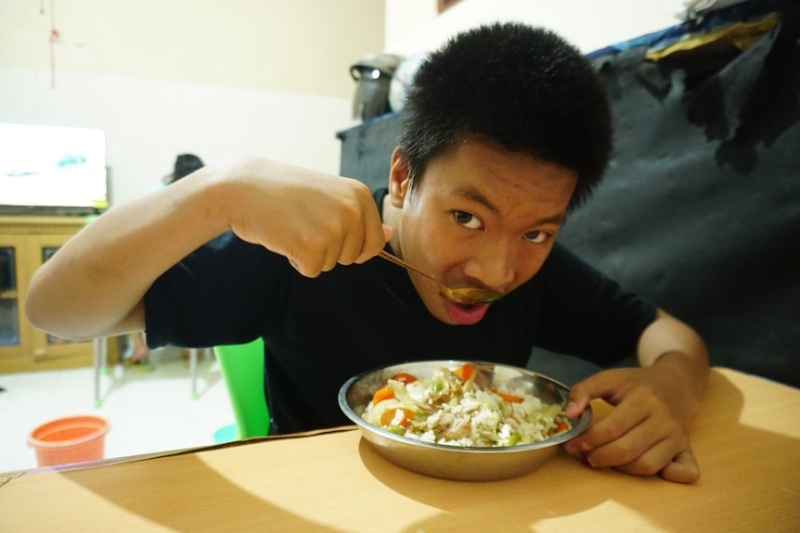
Jonathan is capable of eating a meal on his own. (ABC News: Kristian Oka Prasetyadi)
During the day, Ms Tarunawati supervises his meals and daily exercise, intended to strengthen his leg muscles and straighten his knees.
"He's smart. You just need to teach him how to do something once or twice, and he'll be able to imitate," Ms Tarunawati said.
But Mr Cahyo said nobody could love a child better than their own parents.
"If [Jonathan] were with us, he could've been in a better condition," he said.
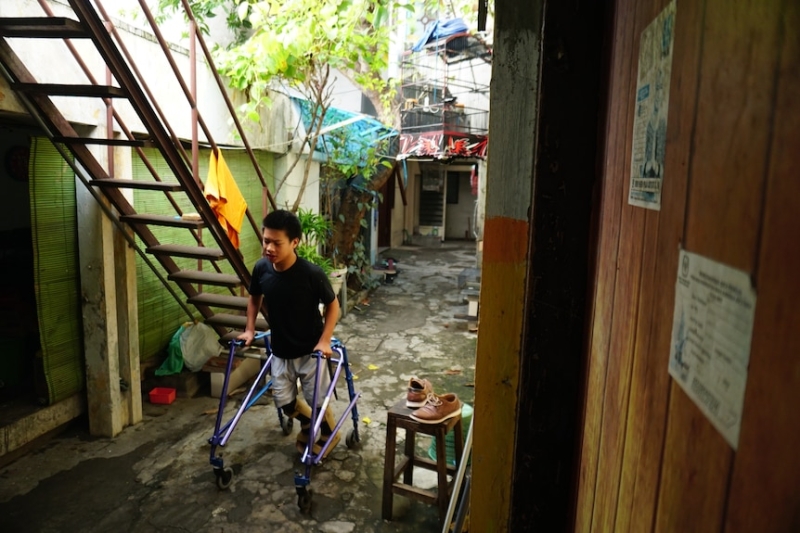
The UN Commitee on the Rights of Persons with Disabilities has said Australia's Migration Act should not be exempt from anti-discrimination legislation. (ABC News: Kristian Oka Prasetyadi)
The family's online petition to garner public support for Jonathan's case has gathered more than 7,400 signatures.
It points to their strong community ties, including involvement with their local church and having regularly donated blood during their time in Melbourne.
"We humbly ask for your support in urging the minister to reconsider our case and allow us to remain in Australia," it reads.
"We are living in constant fear and uncertainty, not knowing what the future holds for our family."

